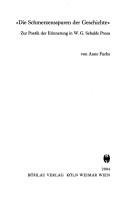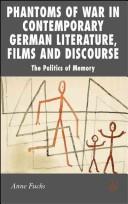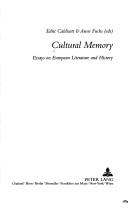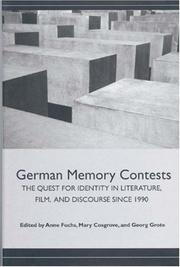| Listing 1 - 10 of 10 |
Sort by
|

ISBN: 3412081043 Year: 2004 Publisher: Köln Böhlau
Abstract | Keywords | Export | Availability | Bookmark
 Loading...
Loading...Choose an application
- Reference Manager
- EndNote
- RefWorks (Direct export to RefWorks)
Sebald, Winfried Georg, --- זבאלד, וו. --- Sebald, Max, --- Criticism and interpretation. --- Sebald, W. G.
Book
ISBN: 1501734814 9781501734816 9781501734823 1501734822 9781501735103 1501735101 Year: 2019 Publisher: Ithaca, NY : Cornell University Press,
Abstract | Keywords | Export | Availability | Bookmark
 Loading...
Loading...Choose an application
- Reference Manager
- EndNote
- RefWorks (Direct export to RefWorks)
In Precarious Times, Anne Fuchs explores how works of German literature, film, and photography reflect on the profound temporal anxieties precipitated by contemporary experiences of atomization, displacement, and fragmentation that bring about a loss of history and of time itself and that is peculiar to our current moment. The digital age places premiums on just-in-time deliveries, continual innovation, instantaneous connectivity, and around-the-clock availability. While some celebrate this 24/7 culture, others see it as profoundly destructive to the natural rhythm of day and night-and to human happiness. Have we entered an era of a perpetual present that depletes the future and erodes our grasp of the past? Beginning its examination around 1900, when rapid modernization was accompanied by comparably intense reflection on changing temporal experience, Precarious Times provides historical depth and perspective to current debates on the "digital now." Expanding the modern discourse on time and speed, Fuchs deploys such concepts as attention, slowness and lateness to emphasize the uneven quality of time around the world.
German literature --- Motion pictures --- Time in literature. --- Time in motion pictures. --- Anxiety in literature. --- Time and photography. --- Time in art. --- Anxiety in art. --- Photography and time --- Photography --- Themes, motives. --- History. --- modern time regime, temporal anxiety, digital now, presentism, precariousness, speed culture.

ISBN: 0230554059 9780230554054 0230279651 0230291635 0230589723 1281914835 9786611914837 Year: 2008 Publisher: Basingstoke Palgrave Macmillan
Abstract | Keywords | Export | Availability | Bookmark
 Loading...
Loading...Choose an application
- Reference Manager
- EndNote
- RefWorks (Direct export to RefWorks)
Collective memory --- Discourse analysis --- First person narrative --- German literature --- Motion pictures, German --- History and criticism --- History

ISBN: 9789004485242 9789042013285 Year: 2002 Publisher: Leiden; Boston : BRILL,
Abstract | Keywords | Export | Availability | Bookmark
 Loading...
Loading...Choose an application
- Reference Manager
- EndNote
- RefWorks (Direct export to RefWorks)
The relationship between Johannesburg's Market Theatre and the economic and political forces of South Africa's apartheid regime was both complex and somewhat ambiguous. The theatre's two founders, Mannie Manim and Barney Simon, however, from idealistic beginnings managed to steer their experimental enterprise around pitfalls ranging from censorship, boycotts and recuperation by big business to the difficulties encountered in finding black authors, let alone black audiences. If the place occupied by the Market institution in apartheid society is emphasized throughout the present study, its contribution to the aesthetic of resistance is also underlined through detailed criticism of the plays and authors dominating the theatre. Pieter-Dirk Uys, Barney Simon's workshop plays and, among others, Black Consciousness plays are subjected to various methods of theatre performance analysis. The reckoning that had to come in the early 1990s revealed itself as globally positive; the reasons for this may be found in the updated concluding part of Playing the Market , which is composed of more general essays (including one on the vibrant Junction Avenue Theatre Company) on how the theatre scene in contemporary South Africa started to change. A postscript reveals more specific aspects of the Market situation in the late 1990s when its hegemony in the New South Africa was already being questioned.

Abstract | Keywords | Export | Availability | Bookmark
 Loading...
Loading...Choose an application
- Reference Manager
- EndNote
- RefWorks (Direct export to RefWorks)
Holocaust [Jewish ] (1939-1945) in literature --- Holocaust [Joodse ] (1939-1945) in de literatuur --- Holocaust juif (1939-1945) dans la littérature --- 82.04 --- 930.21 --- Literaire thema's --- Historiografie. Geschiedenis van de geschiedwetenschap --- European literature --- Holocaust, Jewish (1939-1945), in literature. --- Memory --- History and criticism. --- Social aspects --- 930.21 Historiografie. Geschiedenis van de geschiedwetenschap --- 82.04 Literaire thema's --- Holocaust, Jewish (1939-1945), in literature --- Retention (Psychology) --- Intellect --- Psychology --- Thought and thinking --- Comprehension --- Executive functions (Neuropsychology) --- Mnemonics --- Perseveration (Psychology) --- Reproduction (Psychology) --- History and criticism --- 20th century --- Europe
Book
Year: 1977 Publisher: Ann Arbor University Microfilms International
Abstract | Keywords | Export | Availability | Bookmark
 Loading...
Loading...Choose an application
- Reference Manager
- EndNote
- RefWorks (Direct export to RefWorks)

ISBN: 1571133240 9781571133243 9781571136763 9781571134424 1571134425 9786611949358 1281949353 1571136762 Year: 2006 Publisher: Rochester, NY : Camden House,
Abstract | Keywords | Export | Availability | Bookmark
 Loading...
Loading...Choose an application
- Reference Manager
- EndNote
- RefWorks (Direct export to RefWorks)
Since unification in 1990, Germany has seen a boom in the confrontation with memory, evident in a sharp increase in novels, films, autobiographies, and other forms of public discourse that engage with the long-term effects of National Socialism across generations. Taking issue with the concept of 'Vergangenheitsbewältigung,' or coming to terms with the Nazi past, which after 1945 guided nearly all debate on the topic, the contributors to this volume view contemporary German culture through the more dynamic concept of 'memory contests,' which sees all forms of memory, public or private, as ongoing processes of negotiating identity in the present. Touching on gender, generations, memory and postmemory, trauma theory, ethnicity, historiography, and family narrative, the contributions offer a comprehensive picture of current German memory debates, in so doing shedding light on the struggle to construct a German identity mindful of but not wholly defined by the horrors of National Socialism and the Holocaust. Contributors: Peter Fritzsche, Anne Fuchs, Elizabeth Boa, Stefan Willer, Chloe E. M. Paver, Matthias Fiedler, J. J. Long, Dagmar C. G. Lorenz, Cathy S. Gelbin, Jennifer E. Michaels, Mary Cosgrove, Andrew Plowman, Roger Woods. Anne Fuchs is professor of modern German literature and Georg Grote is lecturer in German history, both at University College Dublin. Mary Cosgrove is lecturer in German at the University of Edinburgh. Winner of the 2007 CHOICE Outstanding Academic Title Award.
Collective memory --- Group identity --- History --- Germany --- Civilization --- Psychological aspects. --- Historiography. --- 800:316 --- Sociolinguistiek --- 800:316 Sociolinguistiek --- Collective identity --- Community identity --- Cultural identity --- Social identity --- Identity (Psychology) --- Social psychology --- Weimar Republic --- Germanii︠a︡ --- Германия --- BRD --- FRN --- Jirmānīya --- جرمانيا --- Nimechchyna --- Gjermani --- Federalʹna Respublika Nimechchyny --- Veĭmarskai︠a︡ Respublika --- Ashkenaz --- Germanyah --- Bundesrepublik Deutschland --- Federal Republic of Germany --- Deutschland --- Repoblika Federalin'i Alemana --- República Federal de Alemania --- Alemania --- República de Alemania --- Bu̇gd Naĭramdakh German Uls --- Kholboony Bu̇gd Naĭramdakh German Uls --- KhBNGU --- ХБНГУ --- German Uls --- Germania --- Republika Federal Alemmana --- Deutsches Reich --- Grossdeutsches Reich --- Weimarer Republik --- Vācijā --- ドイツ --- Doitsu --- ドイツ連邦共和国 --- Doitsu Renpō Kyōwakoku --- Germany (Territory under Allied occupation, 1945-1955) --- Germany (Territory under Allied occupation, 1945-1955 : British Zone) --- Germany (Territory under Allied occupation, 1945-1955 : French Zone) --- Germany (Territory under Allied occupation, 1945-1955 : Russian Zone) --- Germany (Territory under Allied occupation, 1945-1955 : U.S. Zone) --- Germany (East) --- Germany (West) --- Holy Roman Empire --- ドイツ レンポウ キョウワコク --- Deguo --- 德国 --- Gėrman --- Герман Улс --- 20th Century Germany. --- Cultural Debates. --- Ethnicity. --- Family Narrative. --- Gender. --- Generations. --- German Memory Contests. --- Holocaust. --- Identity. --- Memory. --- National Socialism. --- Public Discourse. --- Trauma.
Book
ISBN: 1283296489 9786613296481 1571137866 1571134867 Year: 2011 Publisher: Rochester, N.Y. : Camden House,
Abstract | Keywords | Export | Availability | Bookmark
 Loading...
Loading...Choose an application
- Reference Manager
- EndNote
- RefWorks (Direct export to RefWorks)
The events of 1989 and German unification were seismic historical moments. Although 1989 appeared to signify a healing of the war-torn history of the twentieth century, unification posed the question of German cultural identity afresh. Politicians, historians, writers, filmmakers, architects, and the wider public engaged in "memory contests" over such questions as the legitimacy of alternative biographies, West German hegemony, and the normalization of German history. This dynamic, contested, and still ongoing transformation of German cultural identity is the topic of this volume of new essays by scholars from the United Kingdom, Germany, the United States, and Ireland. It explores German cultural identity by way of a range of disciplines including history, film studies, architectural history, literary criticism, memory studies, and anthropology, avoiding a homogenized interpretation. Charting the complex and often contradictory processes of cultural identity formation, the volume reveals the varied responses that continue to accompany the project of unification.
Group identity --- Collective memory --- Literature and society --- German literature --- History --- History and criticism. --- Germany --- Germany (East) --- Cultural policy. --- Collective identity --- Community identity --- Cultural identity --- Social identity --- Identity (Psychology) --- Social psychology --- 1989. --- German cultural identity. --- German unification. --- West German hegemony. --- alternative biographies. --- culture and politics. --- memory contests. --- normalization of German history.
Book
ISBN: 1350341444 135034141X Year: 2024 Publisher: London : London : Bloomsbury Academic, Bloomsbury Publishing (UK),
Abstract | Keywords | Export | Availability | Bookmark
 Loading...
Loading...Choose an application
- Reference Manager
- EndNote
- RefWorks (Direct export to RefWorks)
Framing Ageing, available open access, addresses scholars from across the Humanities and Social Sciences who want to approach the urgent topic of old age in their work, mapping the intellectual state of the field and putting the most salient concepts in action. Bringing together established and emerging scholars of old age from the humanities and social sciences as well as gerontologists and medical practitioners, this open access book showcases new scholarship and provides new methods and terms for ongoing conversations about old age as an object of analysis in contemporary culture. Cultural policy makers and scholars alike regularly describe a "visibility crisis" of old age, a consistent erasure or repression of images of older people from public view. Co-edited by an art historian and two literary scholars with a shared interest in memory, Framing Ageing examines the in/visibility of old age from a range of disciplinary angles, including philosophy, social history, comparative literature and anthropology. In addition to examining literary texts, this volume includes a chapter in graphic form and carries out innovative analyses of film, the built environment, fine art and commercial images. The ebook editions of this book are available open access under a CC BY 4.0 licence on bloomsburycollections.com. Open access was funded by The Wellcome Trust.
Aging --- Literary studies: from c 1900 --- -Medical sociology --- Psychology of ageing --- Psychological aspects --- Social aspects
Book

ISBN: 3846763772 3770563778 Year: 2019 Publisher: Paderborn Brill | Fink
Abstract | Keywords | Export | Availability | Bookmark
 Loading...
Loading...Choose an application
- Reference Manager
- EndNote
- RefWorks (Direct export to RefWorks)
Die Kultur des Gehens entwickelt sich parallel zur mechanisierten Fortbewegung in Eisenbahn und Automobil und knüpft an die alte Tradition an, die zwischen Gehen, Denken und Schreiben Korrespondenzen entdeckt. Robert Walser setzt seinen romantischen Vorläufern und den urbanen Flaneuren seiner Zeit in seiner Erzählung Der Spaziergang von 1917 eine eigene, selbstreflexive Gangart entgegen.Die deutsch- und englischsprachigen Beiträge untersuchen Walsers Spazieren als poetisches Konzept und als Schreibbewegung, als Form der Naturästhetik und als Absage an die Alpenideologie, im Kontext der Psychiatrie und im Vergleich zu Lessings ambulanter Rhetorik, Lucius Burckhardts Promenadologie sowie den zeichnerischen und architektonischen Spaziergängen von Paul Klee und Adolf Loos.
Adolf Loos --- Alpenideologie --- Spaziergang --- Promenadologie --- Paul Klee --- Naturästhetik --- Lucius Burckhardt --- Lessing --- Flaneur
| Listing 1 - 10 of 10 |
Sort by
|

 Search
Search Feedback
Feedback About UniCat
About UniCat  Help
Help News
News